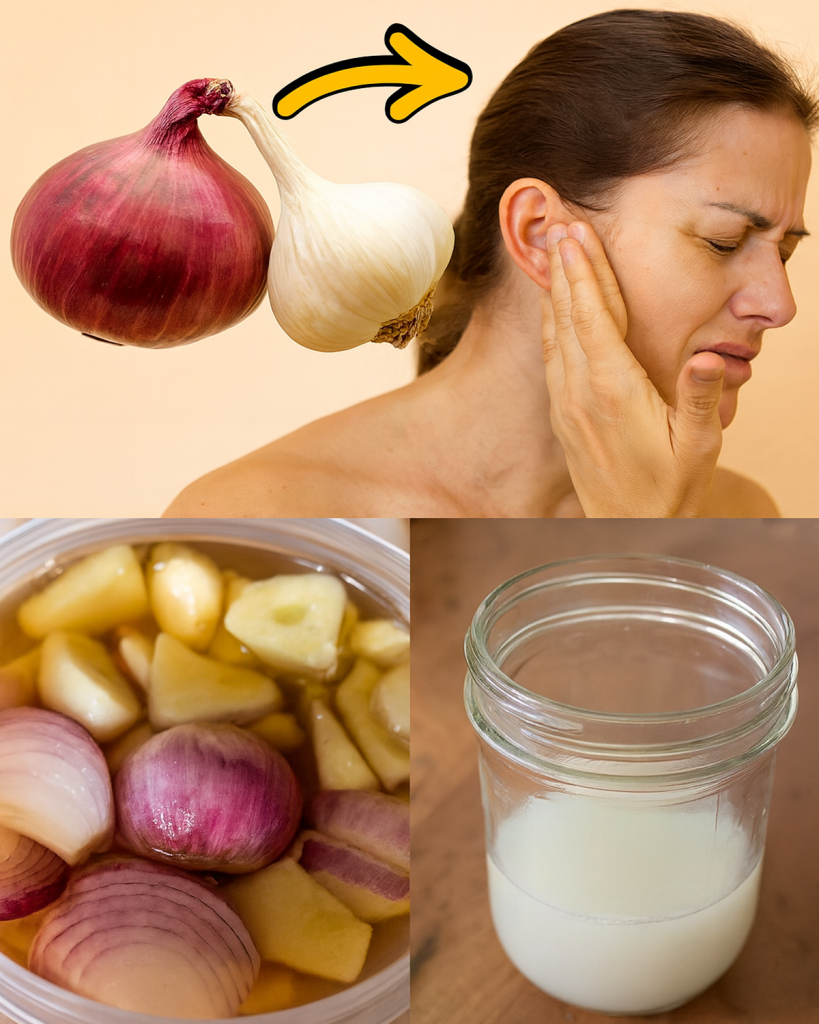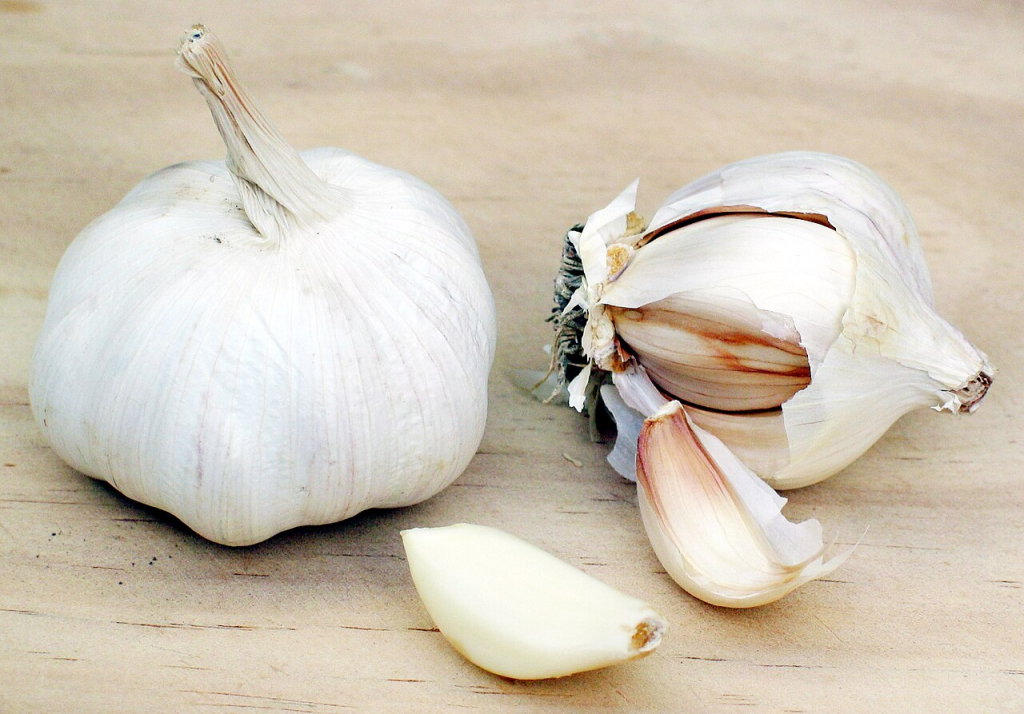Did you know that more than 466 million people worldwide live with disabling hearing loss, according to the World Health Organization? Hearing challenges affect not only the elderly but also younger individuals exposed to loud noise, infections, or unhealthy lifestyle habits. While modern medicine offers hearing aids and surgeries, many people still search for gentler, natural approaches that may support ear health at home.
On our fanpage, readers often ask: “Can simple kitchen ingredients help protect or restore hearing?” This curiosity has grown into an important discussion. Among the most popular folk remedies are garlic and onion. For centuries, these two staples have been used not just in cooking but also in traditional wellness routines, believed to support ear health, circulation, and immunity.
In this article, we’ll explore the fascinating connection between garlic, onion, and hearing. You’ll discover their nutritional benefits, traditional uses, step-by-step preparation methods, lifestyle tips for protecting your ears, and important safety notes. By the end, you’ll have a clear, evidence-informed understanding of how to integrate these natural ingredients into your daily wellness plan.

Understanding Hearing Loss and Its Causes
Hearing loss can occur gradually or suddenly. Knowing the common causes can help you make better choices for prevention and care.
Common Causes of Hearing Decline
- Age-related changes (presbycusis): Natural wear and tear of inner ear cells.
- Noise exposure: Prolonged loud sounds from music, machinery, or urban living.
- Ear infections: Repeated or untreated infections can damage ear structures.
- Earwax buildup: Excess wax may block sound waves.
- Poor circulation: Reduced blood flow can impair the tiny cells inside the inner ear.
Symptoms to Watch For
- Asking people to repeat themselves often
- Turning up the TV or phone volume excessively
- Difficulty following conversations in noisy environments
- Ringing in the ears (tinnitus)
Early attention to these symptoms increases the chances of effective management.

Garlic: Nature’s Antimicrobial Ally
Garlic has been a cornerstone of folk medicine for centuries. Its main compound, allicin, is known for strong antimicrobial, anti-inflammatory, and circulation-supporting properties.
How Garlic May Support Ear Health
- Antimicrobial properties: May help fight bacteria or fungi linked to ear infections.
- Improved circulation: Better blood flow supports the tiny hair cells in the inner ear.
- Immune support: Boosts the body’s natural defense, lowering infection risks.
Traditional Garlic Remedy for the Ears
- Crush 1–2 cloves of fresh garlic.
- Warm slightly in olive oil (do not overheat).
- Strain and allow to cool.
- Apply 1–2 drops in the affected ear with caution.
Important note: This method comes from folk traditions. It should never replace medical treatment for serious infections. Always consult a healthcare provider before trying ear drops.

Onion: A Gentle, Soothing Approach
Like garlic, onions contain sulfur compounds, antioxidants, and flavonoids that are believed to support ear and immune health.
How Onion May Help Hearing Wellness
- Antioxidant activity: Helps protect cells from oxidative stress.
- Natural decongestant: Steam from boiled onions has been used to ease ear and sinus pressure.
- Circulatory support: Compounds in onions may help maintain healthy blood flow.
Onion Wellness Preparation
- Chop one medium onion and boil in a cup of water.
- Strain the liquid and let it cool.
- Drink as a warm tonic, once daily.
This traditional beverage has been consumed as part of folk remedies to support overall wellness, including ear and respiratory health.

Garlic and Onion Together: A Traditional Duo
When combined, garlic and onion create a powerful synergy of antioxidants, sulfur compounds, and natural oils. Many traditional recipes blend them into teas, tonics, or warm compresses applied around the ear area.
Simple Garlic and Onion Tonic
- 1 small onion
- 2 garlic cloves
- 2 cups of water
- 1 teaspoon honey (optional)
Steps:
- Slice onion and crush garlic.
- Boil them in water for 10–15 minutes.
- Strain and drink warm, adding honey for taste.
This tonic is traditionally consumed to support circulation, immunity, and respiratory health, which indirectly benefit ear function.

Lifestyle Tips to Protect and Support Hearing
Garlic and onion can be part of a holistic ear-care strategy, but lifestyle matters greatly.
Daily Habits to Adopt
- Protect your ears from loud noise: Use earplugs in noisy environments.
- Maintain good ear hygiene: Avoid inserting objects deep into the ear canal.
- Stay physically active: Exercise boosts circulation, benefiting the inner ear.
- Eat a nutrient-rich diet: Include omega-3 fatty acids, vitamin C, zinc, and magnesium.
- Limit ototoxic substances: Some medications, smoking, and excessive alcohol can harm hearing.
Foods That Complement Garlic and Onion
| Food | Key Nutrient | Role in Hearing Health |
|---|---|---|
| Salmon | Omega-3 fatty acids | Supports inner ear function |
| Spinach | Magnesium | Protects against noise-induced damage |
| Oranges | Vitamin C | Strengthens immune defense |
| Pumpkin seeds | Zinc | Aids inner ear repair |

A 7-Day Natural Wellness Plan for Hearing Support
Try incorporating garlic and onion into your meals for one week:
Day 1: Garlic-onion tonic in the morning, grilled salmon for dinner.
Day 2: Add raw onion slices to your salad.
Day 3: Garlic sautéed with spinach as a side dish.
Day 4: Warm onion soup with garlic toast.
Day 5: Roasted vegetables with garlic and onion seasoning.
Day 6: Garlic-onion tonic again, plus pumpkin seed snack.
Day 7: Stir-fry with onion, garlic, and leafy greens.
This plan offers balance, variety, and consistent intake of natural compounds believed to support ear health.
Common Myths About Hearing and Natural Remedies
“Garlic and onion can cure deafness.”
False. They may support ear wellness but cannot cure complete hearing loss.
“Putting garlic directly into the ear is always safe.”
Not true. Raw garlic can cause burns or irritation. Proper preparation and medical guidance are essential.
“If I eat garlic and onion daily, I won’t need hearing aids.”
Incorrect. Natural remedies can complement but not replace professional treatments.
“All hearing loss is permanent.”
Not always. Some cases caused by infections or wax buildup can improve with care.

Conclusion
Hearing is one of our most precious senses, and protecting it requires awareness and action. Garlic and onion, two humble kitchen staples, have been used in traditional wellness for centuries to support ear health, circulation, and immunity. While they are not miracle cures, incorporating them into your diet or trying gentle, time-tested preparations may offer supportive benefits.
Combined with lifestyle changes such as noise protection, a nutrient-rich diet, and regular ear check-ups, garlic and onion can be valuable allies in your journey toward healthier ears. The secret lies not in a quick fix, but in consistent, balanced care.
FAQ
Q1: Can garlic and onion really restore hearing?
They cannot restore hearing fully but may support ear wellness and immunity when used consistently.
Q2: Is it safe to put garlic oil in the ear?
It can be safe if properly prepared and cooled, but consult a healthcare provider first.
Q3: How often should I drink onion and garlic tonic?
One small cup daily is a common traditional practice, but moderation is best.
Q4: What other foods support hearing health?
Omega-3-rich fish, spinach, pumpkin seeds, citrus fruits, and nuts all support ear function.
Q5: Should I still see an audiologist if I use natural remedies?
Yes. Professional evaluation is essential for hearing loss, even if you use natural support methods.
*Disclaimer: This article is for informational purposes only. It does not provide medical advice, diagnosis, or treatment. Always consult with a qualified healthcare provider for concerns about your hearing or ear health.




